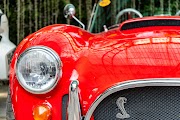So many interesting cars pop-up at Mecum Auctions, including this Hupp Comet Indy Car, the only Hupmobile to ever race at Indy, was built by racer Russell Snowberger to take on the Brickyard in 1932.
Russell Snowberger isn’t the household name of some of his contemporaries, even among fans of the era’s racing. But as anyone who drove against the builder/driver could attest, he was among the best who ever raced and a fixture of Indy Car racing for more than 50 years. One of the charter members of the 100 MPH Club, he achieved the feat in 1934. The earliest members of the 100 MPH Club during the 1930s attained a celebrity status that could be compared to being an Astronaut in the 1960s.
Snowberger’s immense skill—he landed in pole position for 1931—could have landed him a ride with any of the large teams of the era, but instead, he resolutely pursued his own course with homebuilt race cars that proved every bit the equal of the mighty Studebakers, Duesenbergs and Millers of the era.
For the 1932 race, he did have sponsorship, of a sort, as Hupmobile wanted to field an entry, and it convinced Snowberger to remove the Studebaker engine from his 1931 chassis and replace it with a quad-carbureted Hupmobile Eight (stamped HC001) that Snowberger prepared for the race himself. The Hupmobile Comet improved Snowberger’s qualifying speed by 2 MPH over the prior year, and he started in fourth position. He finished 200 laps on the lead lap and tied for his best-ever finish: fifth place and an average speed of 100.791 MPH. He finished the season fourth in points overall.
Many years later, Russell Snowberger’s son John, with an understandable interest in vintage race cars, resurrected the Comet around the original Hupp engine that finished the 1932 Indianapolis 500 race. After completing a restoration (one of two of his father’s cars he restored), John Snowberger returned with his own son to Indy in 2009. Together, they ran Russ Snowberger’s Hupmobile Comet at the Brickyard in the parade before the race, 77 years after its last run there.
For five years straight, starting in 1930, Russell Snowberger finished in the top five at Indy, every one of those in a homebuilt car. Ira “Cotter Pin” Vail was asked in "Automobile Quarterly" to name the five best drivers, in ability, against whom he had driven. He listed Louis Chevrolet, Tommy Milton, Ralph DePalma, Frank Lockhart and "my fifth one will surprise you, because I have to include Russ Snowberger due to his great mechanical ability. As a mechanic-driver, he was the best."
HIGHLIGHTS
The Hupp Comet was driven by Russ Snowberger to 5th Place at the 1932 Indianapolis 500 after qualifying 4th
Snowberger became a member of the 100 MPH Club in the race
Russ Snowberger started 15 Indianapolis 500 races, placing in the Top 5 twice with five straight Top 10 finishes
Snowberger was an icon in racing as a driver, chief mechanic, builder, designer and owner for five decades
This was the only car with a Hupmobile engine to ever compete in the Indianapolis 500
Snowberger prepared the motor himself and stamped it HC001
This car was built by his son, John Snowberger with the original Hupmobile inline 8 engine that ran at Indy in 1932
John Snowberger is known for rebuilding several of his father's race cars and making very high quality 1/8 model cars
Driven in the 2009 Indy 500 parade and is a regular Miller Meet participant at the Milwaukee Mile
Sold on bill of sale
Source: Mecum Auctions









_websize.jpg)









